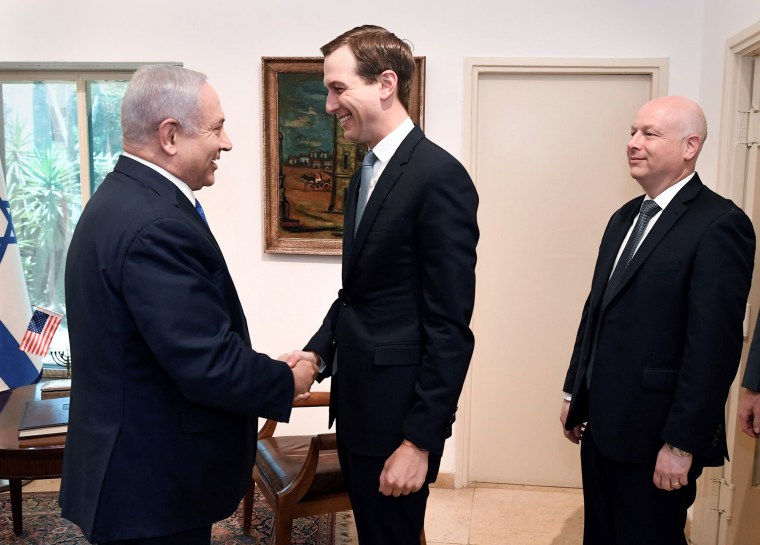The Trump administration today released the economic portion of its long-delayed Mideast peace plan, calling for an investment of about $50 billion to lift up Palestinians economically.
About $28 billion would go to the West Bank and Gaza and billions more to Jordan, Lebanon and Egypt, which have absorbed Palestinian refugees and dealt with other ramifications of the conflict for decades.
But the rollout Saturday does not include the political portion of the plan, and so doesn’t address the most critical questions in the conflict, such as whether the Palestinians will get an independent state and the status of Palestinian refugees, the city of Jerusalem, and Jewish settlements in the West Bank.
Palestinian President Mahmoud Abbas on Saturday reaffirmed his opposition to an economic peace workshop that the U.S. is organizing next week in Bahrain.
Focusing on economic issues between Israel and the Palestinians "is unacceptable before the political situation is discussed," Abbas told top officials of his Fatah party.
With no official participation at the meeting next week from the two main protagonists, Israel and the Palestinians, and scant enthusiasm from others — plus continued uncertainty and strong doubts over the plan's political vision and the distraction of potential U.S.-Iran conflict — expectations are decidedly low.
Speaking about the broader U.S. plan, Abbas said it "will not pass because it ends the Palestinian cause."
The Palestinian President said the American scheme adopts Israel's visions and neglects the longstanding two-state solution, especially after Washington last year recognized contested Jerusalem as Israel's capital.
The economic part of the plan for Palestinians that the White House released Saturday includes a $5 billion “transportation network” to connect the Gaza Strip and the West Bank, which could include a rail line; a built-up Palestinian tourism industry, with roughly $1 billion in investments; and a total of 179 projects total, including for electricity, water, telecom and health care. Of these, 147 projects are in the Palestinian territories and the rest in neighboring countries.
The plan is for the money to come from donor nations, along with investors, which is the focus of the economic summit in Manama, Bahrain, on Tuesday and Wednesday. Neither Palestinian nor Israeli officials are attending.
The White House predicts that within 10 years, the economic plan will double Palestinian GDP, create more than 1 million jobs, cut the poverty rate by half, and reduce Palestinian unemployment to “nearly single digits.”
The political portion of the plan will be released later. The administration had intended to release it shortly after the economic plan, but the Israeli political crisis prompted the most recent delay. The administration now is expected to wait until after Israel’s elections in September before releasing the rest of the plan.
It was unclear why the White House, after working for more than two years to build up anticipation for the plan, released the first part of it quietly on Saturday with little fanfare, rather than on a weekday when news consumption is higher. The timing was also unusual in that was announced on Saturday, the Sabbath day in Israel that is also observed by both Jared Kushner and Jason Greenblatt, Trump’s envoy overseeing the peace plan under Kushner.
The White House said on Twitter, “Generations of Palestinians have lived under adversity and loss, but the next chapter can be defined by freedom and dignity. Today, we're unveiling Peace to Prosperity: the most ambitious international effort for the Palestinian people to date."

